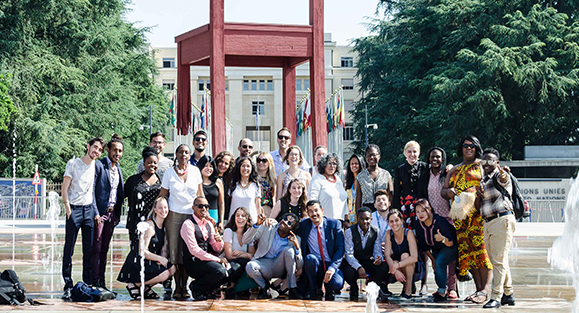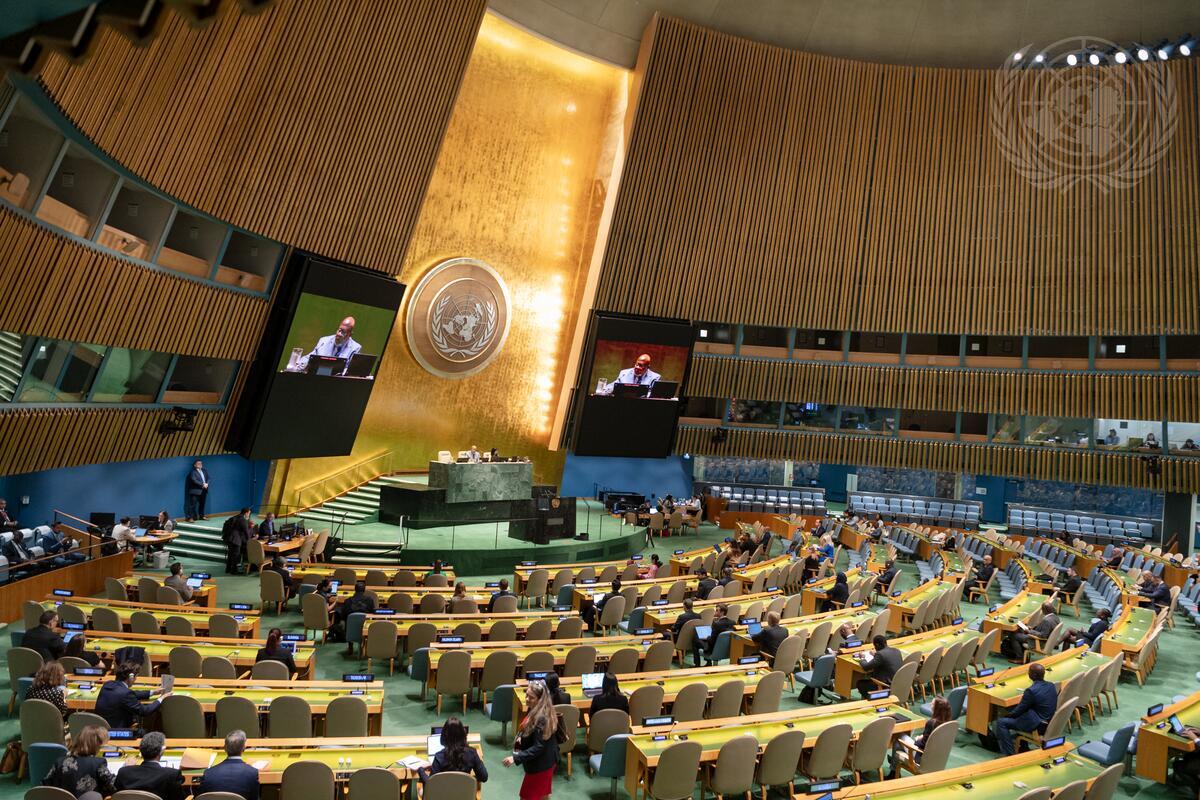
Iran: Human Rights Council must convene a special session
Fifty organisations urge the UN Human Rights Council to urgently convene a special session to address an unprecedented escalation in mass unlawful killings of protesters in Iran.

Staying true to our values is never more important than during times of hardship or crisis. At ISHR, there are five values driving our response to the COVID-19 global pandemic: solidarity, dynamism, alertness, wellbeing and hope. A message from ISHR Director Phil Lynch.
Click here to read more about ISHR’s coverage of COVID-19.
Dear friends and colleagues
Staying true to our values is never more important than during times of hardship or crisis.
At ISHR, there are five values driving our response to the COVID-19 global pandemic: solidarity, dynamism, alertness, wellbeing and hope.
Even while physical distancing measures are implemented across the world, the COVID-19 pandemic has highlighted the extent to which we are all connected and share the same humanity. It has exposed the ways in which all human rights for all people are indivisible and interconnected. Around the world failures to respect and protect the rights to access to information, freedom of expression, adequate health care, and water and sanitation, among others, have adversely impacted on the rights of us all.
Solidarity is an essential value at this time. At ISHR this means showing solidarity with colleagues – with a number of staff volunteering to help and alleviate the workload of others who may have reduced capacity – as well as solidarity with human rights defenders, with our programme staff reaching out to national and regional-level partners to discuss their wellbeing, situation, priorities and needs. Please do reach out to us if there are any ways we can provide support to you at this vital time.
In addition to showing solidarity, we’ve also greatly appreciated receiving solidarity. I’ve personally benefited from the wisdom, insights and advice of other NGO directors in terms of their response to this crisis, and discovered the musical talents of neighbours as we’ve gathered on our balconies every evening to clap and sing our gratitude to the doctors, health care professionals and sanitation workers on the frontlines of this crisis.
This crisis has highlighted the importance of dynamism, adaptability and planning for uncertainty, as well as the limitations of log frames, tightly earmarked funds, and donor restrictions on building organisational reserves.
At ISHR we are determined to use this crisis as an opportunity to innovate and to test and expand new ways of working. Last year, thanks to the support of several donors – including the United Kingdom, Canada, Switzerland and the Netherlands – we launched the ISHR Academy – an interactive, online platform to build the capacity and skills of human rights defenders to leverage the UN human rights system to contribute to national level change. With a significantly increased demand for online training and strategic advocacy support, we’re currently working on new modules for the Academy, as well as translation into Spanish. With further financial support we’d love to develop even more modules and in additional languages. This would increase access to resources, strategic advice and tailored advocacy support for human rights defenders from all regions.
The suspension, postponement and cancellation of a significant number of meetings and sessions of international and regional human rights mechanisms has starkly exposed the need for such bodies to develop means by which human rights defenders can more effectively engage and participate remotely. This is relevant not only now in response to the COVID-19 crisis, but in the longer term in response to the climate crisis and the imperative of reducing travel-related emissions. Effective means of virtual participation are also critical for defenders who lack the resources to travel to Geneva or New York, as well as those for whom travel may be restricted or banned by repressive governments. ISHR programme staff are actively engaged on these issues – leading and participating in strategic discussions and the formulation of practical recommendations as to how to use this crisis as an opportunity to make human rights mechanisms more accessible, effective and protective for defenders worldwide.
ISHR is not the only body looking at ways to use this crisis as an opportunity. Unfortunately, some governments will use this emergency as a subterfuge to more permanently increase surveillance, as well as restrict fundamental rights to freedom of expression, association, assembly, protest and movement.
Alertness is therefore a critical value at this time. We must be vigilant to ensure that any laws or regulations enacted in response to COVID-19 are for the legitimate purpose of protecting public health, and that any restrictions they impose are reasonable, proportionate and strictly time bound.
We must also ensure that they do not operate in a disproportionate or discriminatory way against particular groups. In this regard ISHR staff are being particularly attentive to measures which may impact on human rights defenders working on issues of women’s rights, LGBTI rights, land and environment rights, and migrant and refugee rights, as well as human rights defenders working in highly restrictive or repressive environments. With persons in detention at particular risk, ISHR staff are also using the opportunity to push for the release of arbitrarily detained human rights defenders, including several with underlying health conditions in States including China, the United Arab Emirates and Bahrain.
ISHR is committed to protecting the wellbeing – including the physical, emotional, digital and financial health and security – of our staff and partners.
All ISHR staff have worked remotely since at least 13 March, with exceptions only for staff that need to attend the Geneva office for short periods for essential functions. Staff are working from various locations and states of confinement in Switzerland, France, New York, London, Brussels, Abidjan and Jakarta. We have agreed a complete restriction on work-related travel, with both this restriction and the work from home arrangements remaining in place for the indefinite future.
We’ve put in place a number of measures to seek to ensure that staff are connected and supported and can continue to work securely, productively and collaboratively. This includes a weekly staff check-in and meeting, as well as a weekly Senior Management Team meeting. We have set up a virtual kitchen, where we gather to share coffee at 930 each morning and 1530 each afternoon, and a virtual library, where staff can work together at other times. A number of staff, including me, have children who must be home schooled over the coming weeks and months, or have elderly parents or other dependents who require care, and are juggling this with the demands of work. My clear message to staff has been that the wellbeing of ourselves, our families and loved ones is paramount. It is reasonable that productivity and work hours may decrease during this period. And it is ISHR’s commitment and social responsibility to support and accommodate this, providing our staff with secure income and employment.
Financial security is imperative at this time and I am so impressed and thankful for the initiative of major donors such as the Sigrid Rausing Trust and the Open Society Foundations to proactively reaffirm their funding commitment, to indicate that they will be highly flexible in the use of funds and reporting requirements, and to invite us to reach out if we need further support. Best practice at this time of unprecedented uncertainty is to enable the conversion of project or earmarked funds to core or unrestricted funds. I am working with the Board to evaluate and prepare for a range of scenarios, ensuring the long term sustainability of ISHR. Your contributions as private donors will be vital in this regard – every donation helps!
The final value motivating ISHR at this time is that of hope, which we draw from many places.
We take hope from the doctors, health care professionals and sanitation workers who bravely and tirelessly provide vital care and support.
We take hope from the solidarity and humour that is being shown and shared by people across the world as we realise that we are all in this together.
And we take hope from some of the successes and small wins we’ve had already in 2020 which I’m delighted to share:
This pandemic is far from over. But with a focus and commitment to wellbeing, solidarity, dynamism, alertness and hope we’ll get through it together.
I wish you, your families, your loved ones and your colleagues are and remain healthy, safe and well.
Phil Lynch
Director
[email protected]

Fifty organisations urge the UN Human Rights Council to urgently convene a special session to address an unprecedented escalation in mass unlawful killings of protesters in Iran.

The Escazú Ahora Chile Foundation, the Protege los Molles Foundation and ISHR demand that the investigation, arrest and legal proceedings involving Julia Chuñil's relatives be conducted in accordance with international standards of due process.

At a time of financial strife and ongoing reform for the organisation, States have adopted a 2026 budget cutting 117 jobs at the UN’s Human Rights Office. The final budget endorses proposed cuts that disproportionately target human rights, imperilling the UN’s ability to investigate grave abuses, and advance human rights globally.